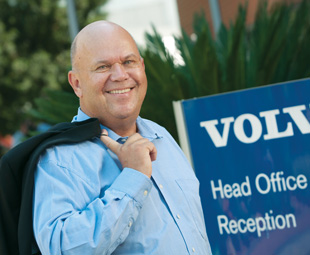Volvo star reflects on seven stellar years

We don’t often realise it, but a lot can change in a mere seven years. Ask Anders Lindblad who, from 2005 until now, has been president of Volvo Trucks Southern Africa. In that period, Lindblad took the company to some great heights.
“Our first mission was to put together a plan of where we wanted to be in the forthcoming years,” he explains. “We decided we would like to be number two in market share – at the time we were number seven.”
With Lindblad steering the fickle rig that was Volvo Trucks at the time, this wasn’t unachievable.
Lindblad, you see, was fortunate to have been very well-travelled due to his various positions within the Volvo Group. After moving to Volvo Trucks in 1995, his business development role between then and 1997 took him to Russia, East Europe, Austria, Thailand and Turkey. He then spent six years with Volvo Peru as his first appointment abroad in 1997, before being put in charge of Volvo’s activities in the Middle East and Africa.
Having experienced different countries and cultures, Lindblad understood that the key to success in South Africa was a completely new approach to business.
“To grow market share in South Africa, you need to improve your customer satisfaction index and your footprint in the SADC region,” he says. And grow market share Lindblad and his team have. Last year proved Volvo SA’s best year ever. The company reached its goal of becoming second in market share, had the highest customer satisfaction rating in both the industry and within the Volvo group, and moved from fourth to second in terms of brand awareness.
One of Lindblad’s greatest achievements at Volvo SA is the customer-orientated approach he instilled. “It’s like fresh flowers – you have to keep cultivating them, otherwise they die. We still have a way to go as a company, which leaves work to be done for the person taking over my position, but I am very proud to be honest.”
On a personal level, the highlight of Lindblad’s 42 years at Volvo has been to see and experience the different cultures in the countries he’s visited. “Very few people get to do that,” he says, adding that this relates to a key approach to Volvo’s success as a business. “You can’t change a country’s culture. You have to adapt to it.”
Lindblad says that, like Volvo, the local market has changed. “When I came here all our customers had their own workshops. Today we sell 80 percent of our trucks with a service agreement. Transporters are going back to their core business of transporting, and we are going back to our core business of providing the units and taking care of their service.”
But it hasn’t all been a bed of roses, with Lindblad expressing concern at the lack of skills among drivers and mechanics in the local industry. “Education needs to be better, but that’s something you can’t wait for,” he says. “That’s why we have been running apprenticeship programmes for the last five years.”
Known as Stars For Life and Skills For Life, the programmes give children and underprivileged people the opportunity to complete their education and enter Volvo’s apprenticeship programmes. Lindblad is proud of the success of the programmes and notes that 99 percent of all apprentices that have passed through are still working in Volvo service centres.
The Stars For Life initiative is Volvo’s biggest corporate social responsibility programme worldwide, and Lindblad will continue to run the programmes pro bono for the next year.
Summing up his experience with the company, Lindblad says with a laugh: “In 2005, I was asked what my vision for this company was, and instead of saying like everyone else that we’d like to be number one, I said my target was to be bigger than Volvo Australia. This was at a time when the two countries were fighting it out on the rugby and cricket fields. We are now bigger in everything we do, and we are extremely happy to have achieved what we have in the South African market – including being better than Australia!
“My time has been challenging, but it has also been so rewarding from both a business and private point of view,” he concludes.
Published by
Focus on Transport
focusmagsa



 !
From 1 Apri
!
From 1 Apri

 Big news from FOCUS on Transport + Logist
Big news from FOCUS on Transport + Logist





 FUSO: Driving the Future of Mobile Healthc
FUSO: Driving the Future of Mobile Healthc



 A brand
A brand




 Wondering about the maximum legal load for a
Wondering about the maximum legal load for a 
 The MAN hTGX powered by a hydrogen combus
The MAN hTGX powered by a hydrogen combus

 Exciting News for South African Operators
Exciting News for South African Operators
